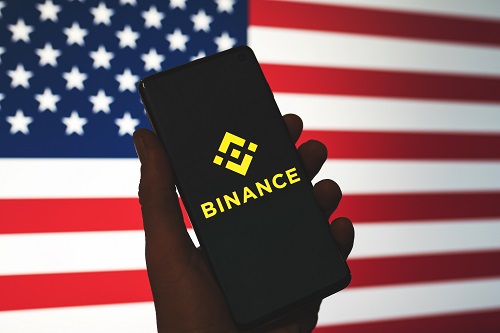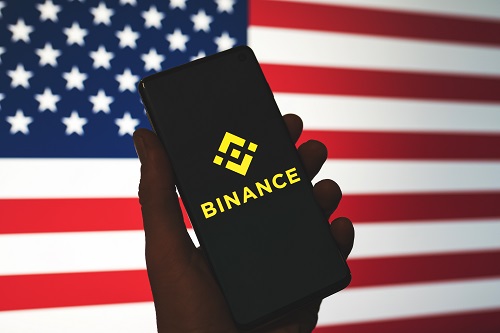
[ad_1]

Key Takeaways
The world’s biggest cryptocurrency exchange was sued by the SEC Monday
Binance and its CEO Changpeng Zhao have fired back, denying any wrongdoing
Our Head of Research, Dan Ashmore, looks into what it all means for crypto, and who is to blame
In a development that surprises precisely nobody, the SEC is suing Binance and its CEO, Changpeng Zhao.
Before we get into what it all means for crypto, let’s quickly surmise what the lawsuit entails. The SEC outlined in a complaint filed Monday that the “defendants have enriched themselves by billions of US dollars while placing investors’ assets at significant risk”.
The charges are plenty, but among the most glaring is the SEC allegation that Binance knowingly operated in the US, despite repeated claims from Zhao and Binance that American consumers could not transact on the exchange (instead, a Binance.US subsidiary was launched for US customers in September 2019 after parent company Binance.com claimed they were leaving the US).
The SEC alleges that “Zhao and Binance in reality subverted their own controls to secretly allow high-value US customers to continue trading on the Binance.com platform”, adding that “Zhao and Binance secretly controlled the Binance.US platform’s operations behind the scenes”. A selection of entities and subsidiaries are named as Binance-affiliated and accused of further transgressions in the suit. One of these entities is the Zhao-controlled Sigma Chain, accused of engaging in “manipulative trading” to boost volume on Binance.
The SEC also accuses Binance of commingling customer funds and moving them around as they please: “Lacking regulatory oversight, Defendants were free to and did transfer investors’ crypto and fiat assets as Defendants pleased, at times commingling and diverting them in ways that properly registered brokers, dealers, exchanges, and clearing agencies would not have been able to do”.
Then there is the heart of the issue, a question that has dogged crypto for a while now: what constitutes a security? While there are certainly grey areas within crypto, most notably stablecoins, there is the reality that a massive chunk of the tokens on the market will inevitably be seen as securities in the eyes of the law.
At the end of the day, that is really all that matters. It appears Binance was more aware of this than anyone. One quote mentioned in the lawsuit is from (unnamed) Binance chief compliance officer in 2018, who messaged a colleague saying, “we are operating as a fking unlicensed securities exchange in the USA bro.” It seems the SEC agrees.
Binance avoided regulation
That same CCO is also quoted elsewhere in the lawsuit as maintaining that “we do not want (Binance).com to be regulated ever”. To this day, Binance.com still claims to have no headquarters, and has been involved in repeated skirmishes with regulators.
In May, the Commodities Futures Trading Commission charged Binance with the “willful evasion of federal law and operating an illegal digital asset derivatives exchange”. The complaint went on to accuse Binance of “(failing) to implement basic compliance procedures designed to prevent and detect terrorist financing and money laundering”.
This was a month after the SEC sued Paxos, the New York-based issuer of the Binance-branded stablecoin, BUSD. I wrote a deep dive on what that meant for crypto here, but again, a violation of securities laws was the trigger for the SEC.
There is more. According to Bloomberg, the U.S. Department of Justice’s national security division is also conducting an inquiry into whether Binance allowed Russian customers to access the exchange, which would have been in violation of U.S. sanctions following the invasion of Ukraine.
All these cases and allegations mean the SEC lawsuit cannot be a surprise, particularly amid what is a wider regulatory clampdown in the US on the industry – SEC chair Gary Gensler last month slammed the industry for “mass non-compliance”, summing up the enforcement agency’s views on the space.
Is Binance to blame?
Many crypto fans are automatically taking the side of Binance. To me, this misses the point. Binance has operated in an intentionally opaque manner for years, one which I have argued repeatedly is damaging for the entire crypto industry. Not only that, but it goes against one of the pillars of cryptocurrency: transparency and reducing the need to trust centralised third parties blindly. Those are two of the core reasons why Satoshi Nakamoto developed the blockchain as we know it.
Look no further than the issue around proof of reserves, which exploded onto the scene following the collapse of FTX in November. Binance claimed to be leading the way in an industry-wide move to be more open with customers. However, their proof of reserves reports made no reference to liabilities whatsoever. Instead, CEO Zhao said on Twitter that “liabilities are harder” before promising that “we don’t owe loans to anyone. You can ask around”.
Only in crypto would you see a CEO assuring his customers on Twitter that there was no need for a proper audit to prove funds were safe. Not to mention, this came a few weeks after FTX CEO Sam Bankman-Fried did the same, promising that “FTX is fine. Assets are fine” and “FTX has enough to cover all client holdings. We don’t invest client assets, even in treasuries”. Both tweets have since been deleted.
“Centralised crypto companies – like Binance – don’t demonstrate any meaningful proof of reserves, so there’s an implied trust that assets are custodied appropriately”, says Mona El Isa, founder of Enzyme, the decentralised asset management protocol.
And that is the issue – nobody knows what is going on behind the scenes at Binance. This truth was hammered home when Mazaars, the audit firm which had overseen Binance’s proof-of-reserves report, announced it was suspending work with the exchange due to “the way these reports are understood by the public.” Mazars also summed up how futile these reports were when liabilities were not included. Proof-of-reserves reports “do not constitute either an assurance or an audit opinion on subject matter. Instead they report limited findings based on the agreed procedures performed on the subject matter at a historical point in time.”
What next for crypto?
The markets fell on the news. Bitcoin fell 5.1% to $25,600, currently trading at $25.800. Ether sold off 3.6%, while Binance’s native token, BNB, fell 8%. Coinbase stock dropped 10%.
The news may not be overly surprising, but amounts to another body blow for an industry that is getting rattled by regulators thus far this year. It appears increasingly clear that crypto in the US will be forced offshore, which is a big problem for the industry, given the US remains the financial centre of the world.
The crypto world may claim to be decentralised, and parts of it are, but the reality is that people still need these centralised platforms to onboard into the blockchain world. The possibility that a lot of these firms will be pushed abroad therefore amounts to a real concern, as those rails to crossover from the fiat realm will become more inaccessible.
While it will certainly still be possible to use crypto, it will be a lot more inconvenient – and that is just for retail. The biggest problem regards institutional investors, where crypto is fighting a battle for legitimacy following a torrid year last year, where it was laced with scandals. Whether you agree with regulators or not, the reality is that institutional capital needs to comply, and lawsuits like this push crypto further away from attracting Wall Street and trad-fi capital on the regular.
I wrote last week about how Binance’s dominance was falling in response to all these issues. However, despite this dropoff, it remains an absolute juggernaut and the biggest company in the space by far, with a colossal 48% share of trading volume. Cryptocurrency was brought to its knees by Luna, Celsius and FTX. Were something to happen Binance, it would be catastrophic.
For now, Binance will continue fighting back against regulators. Zhao posted a poll on Twitter Tuesday where he asked the Internet, “who protects you more?”, with answers supplied as SEC and Binance. At time of writing, the responses were 85% in the favour of Binance.
In response to a tweet from Gary Gensler, where he said that “through thirteen charges, we allege that Zhao and Binance entities engaged in an extensive web of deception, conflicts of interest, lack of disclosure, and calculated evasion of the law”, Zhao wondered aloud whether “(Gensler) ever reads the comments under his post, from the consumers he is supposed to protect”.
While I think some of the regulatory clampdown may be somewhat heavy-handed, I am having a hard time feeling sympathy for Binance. I have lamented many a time about how Binance’s refusal to be transparent holds the entire crypto industry back. Its proof of reserves report, mentioned above, was absolutely pitiful and as far away from a formal audit as can be imagined. Why don’t they just publicise their liabilities if they owe nobody any money?
Then they were forced to apologise in January when they accidentally mixed collateral and customer assets. “Collateral assets have previously been moved into this wallet in error and referenced accordingly on the B-Token Proof of Collateral page,” the spokesperson told Bloomberg. “Binance is aware of this mistake and is in the process of transferring these assets to dedicated collateral wallets” the spokesperson added. The story went away and appeared to have been a mistake, but this is the exact kind of thing that regulators are there to protect against.
This is a company which has an approximate 67% market share and saw $5.29 trillion of trading volume in 2022! It must do better, and this day was coming. Because, in slightly more polite terms than their compliance officer put it above, this is an unregulated securities exchange in the eyes of the law. And they know it, even if they disagree with it.
For crypto, this a blow, and despite Binance and Zhao’s tweets and statements denying any wrongdoing, the lawsuits are mounting. The company continues to operate with minimal transparency, a web of subsidiaries and offshore entities without any physical location. No amount of tweets will change that, no passionate poll blaming lawmakers.
Crypto is hurting, and the missteps of these big centralised firms are a contributing factor.
[ad_2]
Source link




